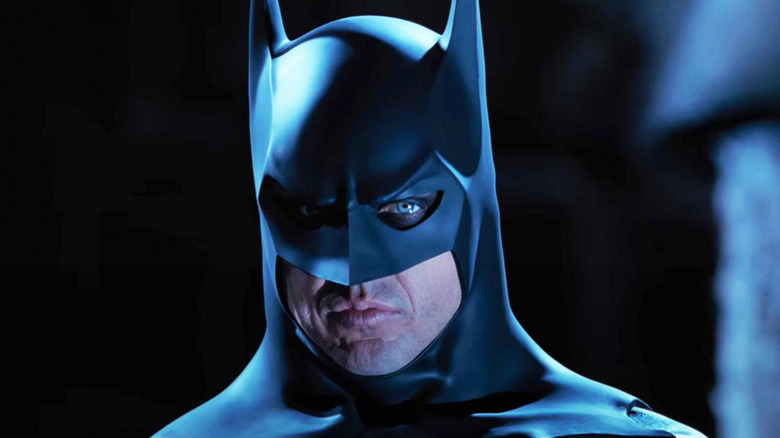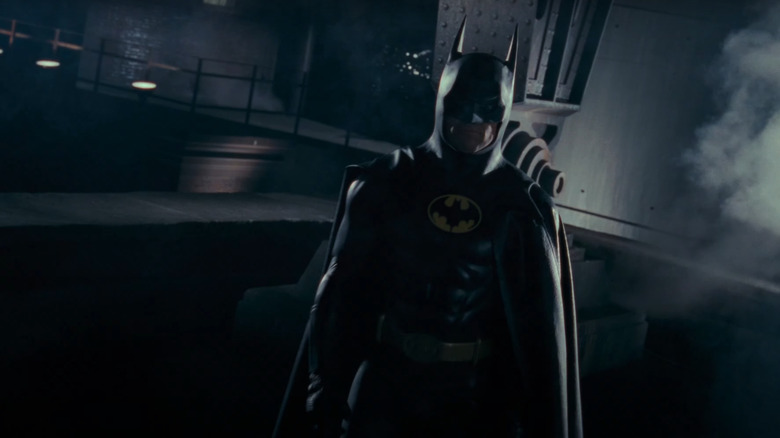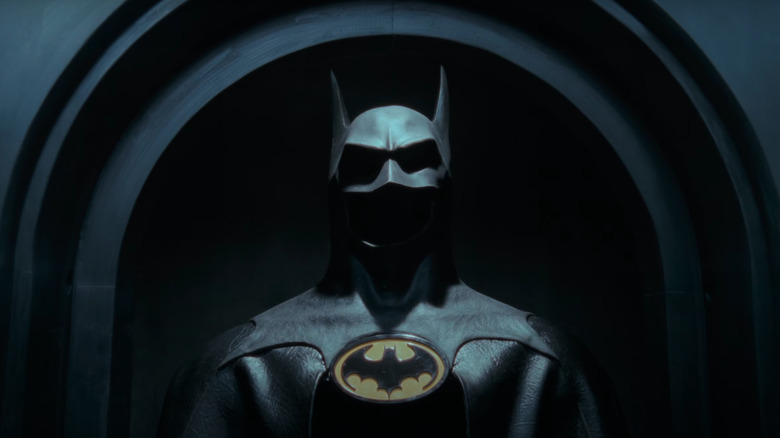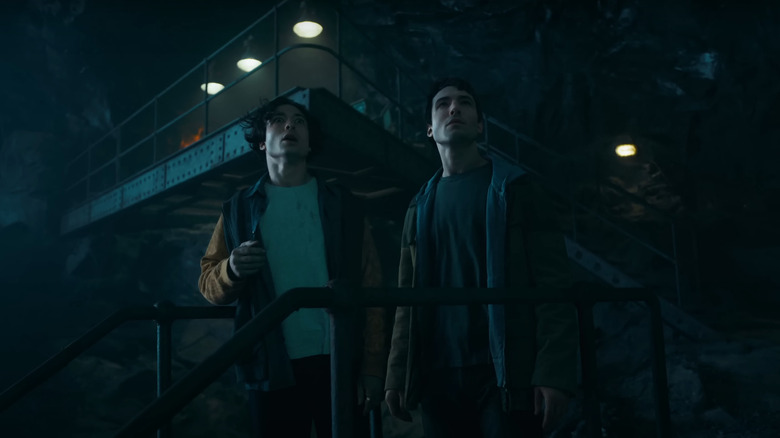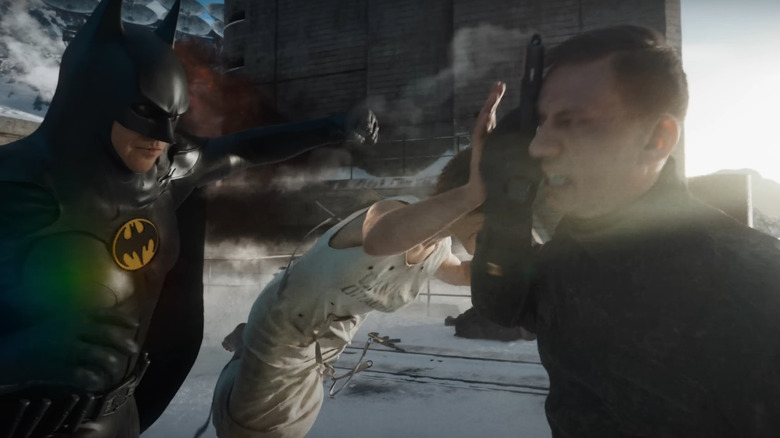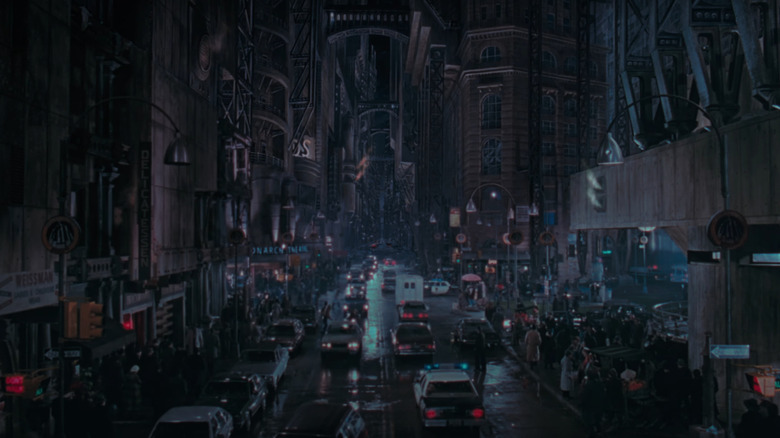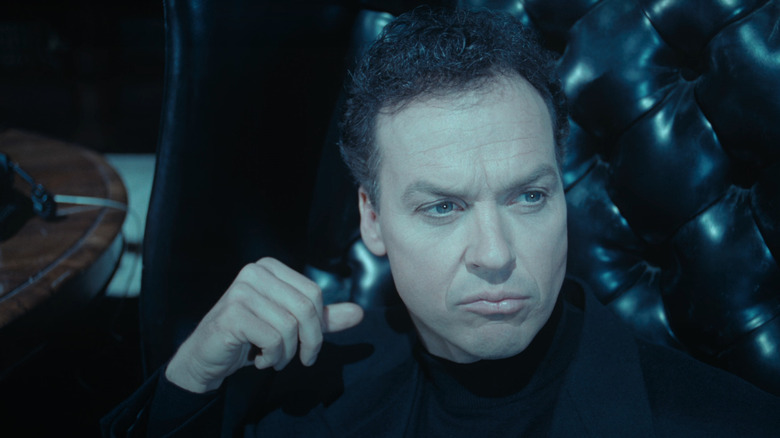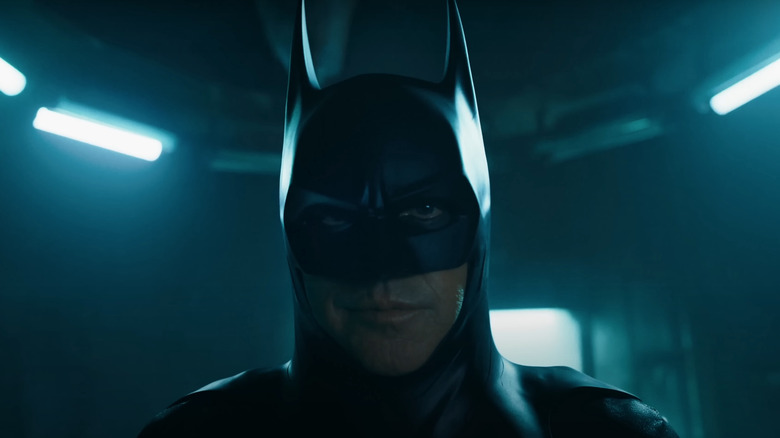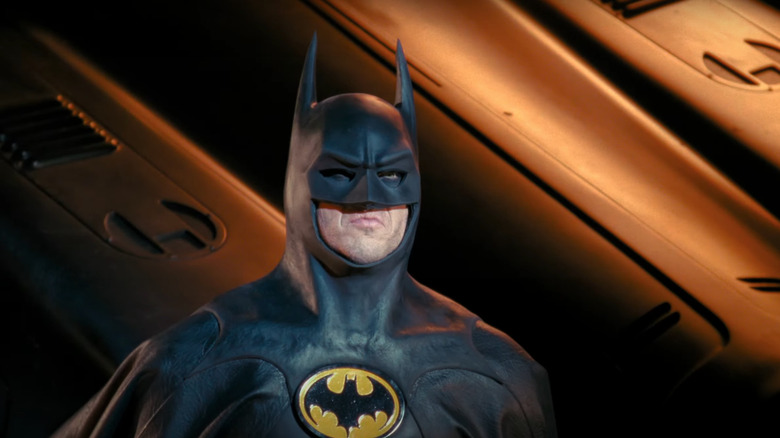Why The Flash Bringing Back Michael Keaton's Batman Has Us Very Worried
When I was a kid, my parents rented a wood-paneled CRT TV from the electronics store down the street. It had a dodgy remote control that only worked half the time and the picture quality was whatever the total opposite of 8K HDR is. The first time I ever saw a movie was on its curved glass facade. But what I remember most about that tube TV is that it was the first screen on which I saw Michael Keaton's Batman.
Over the course of my life, I've tried at various points to figure out just what it was about the sculpted black rubber of Keaton's cowl that resonated so deeply. It felt elemental in some way, like it had existed long before Tim Burton brought it before a camera, and its image exists as a fundamental layer of developmental sediment in my mind. There were motor skills, then language, then Michael Keaton's Batman.
Now, 30 years after this character had such a profound impact on me, they're dredging him up to help sell the latest attempt at making a good DC movie with "The Flash." Michael Keaton walked away from Batman after 1992's "Batman Returns," leaving behind two perfect movies as the Dark Knight. Now, that legacy is under threat. Am I being a tad dramatic? Yes. But it's only out of my love for these movies and the potential for this nostalgia play to sour the whole thing. And even though "The Flash" isn't out for months, test screenings suggest it's going to be great, and DC Studios co-head James Gunn says "The Flash" is one of the best superhero movies he's ever seen, I'm about to tell you why the whole thing might be a terrible idea.
Keaton's casting controversy
In all honesty, there's a part of me that's excited to hear my childhood hero is returning, but there's also something that just isn't sitting right with me about it. In order to understand why bringing Michael Keaton back for "The Flash" is worrying, you have to start at the beginning of the "Beetlejuice" star's run as the beloved icon. So bear with me while we delve into the genesis of "Batman."
By now, most know the story of how, after years of the Caped Crusader struggling to shake the campy image of Adam West's '60s TV show, Tim Burton's "Batman," successfully returned the character to his roots as a mysterious lone vigilante. It's also well known that Burton was inspired by artists and writers such as Frank Miller, whose seminal graphic novel "The Dark Knight Returns" had similarly revitalized Batman for comic book readers in 1986. But the director wasn't just seeking inspiration from outside sources. With the box office smash that was 1989's "Batman," Burton brought to life a singular vision, crafted with the help of a cast and crew who couldn't have been more in sync.
That included his leading man. Michael Keaton's casting as Batman caused a now-infamous uproar among fans, who somewhat understandably questioned whether the star of "Night Shift" and "Mr. Mom" could project the pre-eminent power of as iconic a figure as Batman. The controversy had Burton fighting for Keaton after the pair had worked together on the director's then-most recent film, "Beetlejuice." And although this may have seemed like the filmmaker was just sticking up for his pal, there was more to it.
Shared vision
What outraged fans hadn't realized was that Keaton had an angle on who Bruce Wayne was, and exactly how to play him. As he told the In The Envelope Podcast, "I always knew from the get-go it was Bruce Wayne, that was secret. It was never [...] Batman [...] It's about Bruce Wayne — who's that guy? What kind of person does that?"
But it wasn't just that Keaton knew how to play Bruce Wayne/Batman, it was that his director saw things the same way. In Les Daniels' book "Batman: The Complete History," the actor explained how he went into a meeting with the director thinking, "I have my interpretation of what this movie is, and I have an idea for what I would do, but I can't imagine that anyone would share that." But they did. He continued, "As I was talking to Tim, he just kept nodding, and then I saw his face actually getting more excited [...] I knew that he and I were headed down the right road."
Meanwhile, writer Sam Hamm worked closely with Burton to craft a script that truly represented their dark take on Batman. And when Jack Nicholson agreed to play a truly scary version of The Joker, Burton found himself with yet another artistic comrade. As he explained in a 1989 interview, "The thing with Jack is that he won't do a movie unless he feels like everybody's in sync and making the same thing. So before we ever walked on the set, I knew what he was gonna do." With actors, the director, and writers aligned, "Batman" was shaping up to be a rare instance of a truly singular artistic vision manifesting through a collective effort.
Can The Flash do Keaton and Burton justice?
There was still one piece of the puzzle left before Tim Burton could bring his Batman universe to life — more on that later. But by now, it should be obvious that "Batman" was a unique movie in the sense that so many of the creatives involved were on the same page — even if Burton found making "Batman" completely torturous. That was crucial to making it such a memorable and influential film. So what does any of that have to do with "The Flash?" Well, by bringing Keaton into the upcoming film, director Andy Muschietti and the powers that be at Warner Bros. have tapped into a legacy they might not be fully prepared, or worse, aren't concerned about continuing.
This isn't to say that "The Flash" is going to be a bad movie in any way. It's simply to say that a project designed around another character, which features Ben Affleck's Batman, two versions of The Flash, introduces a new Supergirl, and involves the return of villains from "Man Of Steel" can't possibly do Keaton's Batman the justice he deserves. More importantly, it can't do justice to Tim Burton's singular artistic vision. All it can ever hope to do, given such a cramped cast — and that's to say nothing of the narrative leg work this film is doing by resetting the multiverse and teeing up James Gunn's "Superman: Legacy" — is to mimic that vision. All I'm saying is, I truly hope it does a decent job. My lingering question, however, is "how can it?"
Digital Dark Knights
We've already seen how many factors had to fall into place in order for Tim Burton to create as effective a film as he did back in '89. Unhappily, what we're likely getting with "The Flash" is what we've gotten with other modern attempts at leveraging the popularity of classic blockbusters. That is to say; uncanny confections of beloved characters, close enough to the original to look convincing but not close enough to have any of the cultural impact or artistic meaning. How many CGI 1980s Arnold Schwarzeneggers will it take to convince us that this digital necromancy is folly?
I know we'll at least be spared a CGI Michael Keaton who will, of course, be returning in full flesh and blood form. But did you see "The Flash" trailer? There's a point at which an obvious CG version of his Batman dives into some sort of industrial pit to take out a group of thugs, and there's something genuinely jarring about seeing the hero we all know for his awkward Bat-turn and stilted gestures move with the unnatural slickness of a modern digital double.
But even if there were no CGI Keaton in "The Flash," it wouldn't matter. The question with all these ungodly resurrections of beloved characters from a bygone time is this: what do they mean removed from their original context?
Gotham City and the world of the Burtonverse
In terms of context, Michael Keaton's Batman was somewhat defined by Anton Furst and Bo Welch's production design on "Batman" and "Batman Returns" respectively. Saying that Gotham City is a character in these movies is beyond cliché by now, but there is a symbiotic relationship between Gotham and Batman. It's a complaint you hear about Christopher Nolan's Gotham in "The Dark Knight," where the director mostly used Chicago as a stand-in, or "The Dark Knight" rises and its heavy use of Pittsburgh cityscapes — none of these places felt like Gotham City. And often, Batman felt out of place within them, especially when he was shot fighting Tom Hardy's Bane in broad daylight.
Production designer Anton Furst's creative approach to Gotham City, on the other hand, was, you guessed it, completely in line with Burton's grim conceptualization of Batman's world. This made Keaton's Batman all the more believable. He was the human manifestation of Burton and Furst's industrial hellscape. His black rubber and perma-scowl represented the decrepit Gotham of the Burtonverse in human form — as if a gargoyle had pried itself from the side of a gothic edifice, become flesh, and waged war on the criminal activity it had seen play out for decades on the street beneath. How, if at all, will that fit into the world of "The Flash" — a movie made in the age when blockbusters have increasingly shed any artistic ambitions in favor of appeasing fan expectations? Do I know that Muschietti has no artistic ambitions with this movie? Of course not. But what's the likelihood that whatever artistic ambitions he does have will put Keaton's Batman at the center? Or not be overshadowed by the need to please fans and set up the next phase of DC's cinematic saga?
Loner to mentor?
You might say, "Why should Michael Keaton be the center of a movie about The Flash?" But that's the point. He makes sense as one element of Tim Burton's overall artistic vision. Yanking him from that context and dropping him somewhere in the twisted wreckage of the Snyderverse and its various offshoots just seems kind of sad.
All of this wouldn't be so concerning if "The Flash" trailer didn't suggest we might be in trouble. Aside from a scene in which Keaton appears Batsuited up in the middle of the day — a big Batman-on-film faux pas — there's the slightly too tongue-in-cheek delivery of his legendary line "I'm Batman." It comes as Keaton emerges from the shadows of the Batcave, with Ezra Miller's two versions of Barry Allen looking on. After which, it becomes clear that Keaton's Dark Knight will be playing some sort of support role in their quest to reset timelines following Allen's multiversal adventure gone awry.
But the Keaton Batman/Bruce Wayne was always a loner, and that's how he worked best. The actor even played up the brooding loner angle by cutting more than half of his own dialogue from "Batman Returns," and it worked brilliantly. To have him in some sort of Tony Stark-esque role — which was rumored to be one of the original plans for future DC movies before James Gunn took over — just seems to undermine much of the mystery that made this character what he is. Perhaps this Bruce Wayne has evolved in the time he's been away. And that's fine — intriguing, even. I just really hope that element is addressed and it makes sense within the framework of the film.
The Flash and Burton's films are very different
In a "Batman" making-of featurette, Michael Keaton said that before he took on the lead role, he became very aware that, "if this character doesn't work this movie doesn't work." But that goes both ways. If the movie around Batman doesn't work, then Batman doesn't work. And with "The Flash," it seems we're talking about a wholly different approach than "Batman" and "Batman Returns" — both of which were tailored around Batman himself.
"The Flash" looks set to be a fun blockbuster outing with some truly emotional moments stemming from Barry Allen and his mother's relationship. The "Flashpoint" storyline on which it's based is one of the best-known DC story arcs of the modern age, and for good reason — though, the film does feel too small for its source material. It should make for "Spider-Man: No Way Home" levels of entertainment, and DC certainly needs that boost right now. I can't wait to see it.
It's just that, and this isn't an exaggeration, Tim Burton's Batman films, Michael Keaton's performances in them, and Anton Furst and Bo Welch's Gotham Cities helped shape who I am, and I know I'm not alone. They spoke to some aesthetic sense in me so profoundly, and at such a young age, that I feel protective of them, and maybe that's unfair. These aren't my movies. But what I do know is that they weren't just entertaining. They weren't just fun. What those two films have to say from an artistic standpoint is the topic of an even bigger article. Suffice it to say that "Batman" and "Batman Returns" represent the unlikely realization of the kind of artistic vision you don't see in the blockbuster space anymore.
Hoping for the best
In his controversial New York Times piece, Martin Scorsese wrote that modern film franchises, "lack something essential to cinema: the unifying vision of an individual artist" As a kid, I thought I was just watching cool Batman movies. Now, I realize "Batman" and "Batman Returns," by smuggling in that "unifying vision of an individual artist," were really making me fall in love with art.
In that sense, my concern about bringing Keaton back is more a concern about the direction of popular movies in general. There's plenty of incredible artistic expression to be found in movie-making today, arguably even more so than when I was a kid. Just in the last year, I've already been blown away by films the cutting-edge liminal nightmare that was "Skinamarink" and the hauntingly brilliant "Aftersun." But there's something to be said for sneaking some of that artistry into blockbuster filmmaking — and I guess I'm saying it.
I hope there's at least an element of that in "The Flash." I hope some kid sees Michael Keaton's Batman in that movie and his iconic image hits them as profoundly as it did me. I worry that without the rest of the artistic vision surrounding him, it won't. But I'm hoping. And I'll be there on opening night to catch a glimpse of my childhood hero back in the suit after 30 years. It'll be weird seeing it play out in the sharp digital light of IMAX and not projected by a tube across glowing scanlines, obscured by layers of grain, but we've come a long way since my parents rented that TV. I just hope it's been in the right direction.
